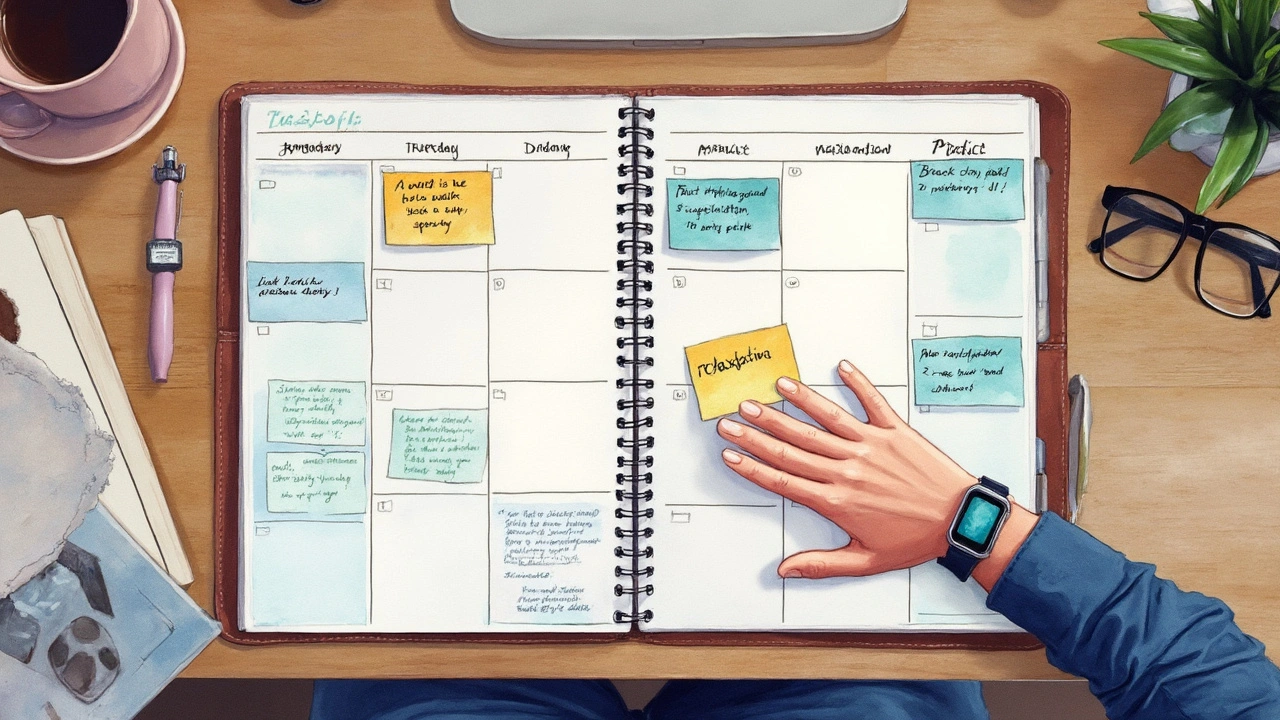If you think relaxation is just zoning out on weekends, you're missing out on a serious work advantage. Have you ever noticed how hard it is to get anything done after a stressful meeting or a rough night’s sleep? That’s no accident. When your mind is in overdrive from stress, your ability to focus, remember things, and make clear decisions tanks—sometimes faster than you realize.
The cool thing is, you don’t need a fancy spa day to fix this. Even a few minutes of unplugging right at your desk can shift your whole mood and impact what you get done before lunch. Think of relaxation not as a treat, but as a tool for getting through your to-do list with way less pain—and way fewer mistakes. It’s about using proven tricks—like deep breathing or minute-long meditations—that calm your nerves and jumpstart your brain, so you get actual results at work. Ready to ditch the stress-headache cycle for something more productive?
- Why Stress Tanks Your Productivity
- How Relaxation Tricks Your Brain for Better Work
- Easy Relaxation Methods to Try at Your Desk
- Building Relaxation into Your Daily Routine
- Big Payoffs: Stories and Science from Real Workplaces
Why Stress Tanks Your Productivity
Let’s face it—stress is the productivity killer that sneaks up on everyone. Your brain gets soaked with stress hormones like cortisol, and suddenly, it’s way harder to focus, remember that important detail, or make smart choices. There’s solid science behind that—researchers at Yale found that chronic stress actually shrinks the area of your brain responsible for learning and memory. No wonder you can’t think straight during those intense work weeks.
Companies are noticing this too. One survey by the American Institute of Stress reported that 63% of workers feel ready to quit due to workplace stress. That’s not just bad for people; it hits businesses with lower output and more sick days.
Here’s what stress really does to your performance:
- Zaps your focus, so small distractions suddenly become major.
- Makes you more likely to mess up, because your mind is elsewhere.
- Cuts down on creativity—problem-solving just isn’t so easy when your brain’s on high alert.
- Slows down decision-making. You’re more likely to second-guess yourself when you’re tense.
For a quick look at how stress wrecks the workday, check out these stats:
| Effect of Stress | Impact on Work |
|---|---|
| Reduced Concentration | 56% of workers say it hurts their output |
| Increased Absenteeism | Over 1 million workers miss work daily due to stress (US) |
| Burnout | Nearly 77% of employees report feeling burnt out at current job |
Stress isn’t just a feeling. It actually messes with how your body works and stops your brain from running at full speed. That’s why learning relaxation techniques isn’t just about feeling chill—it’s about doing your best work and actually enjoying your job again.
How Relaxation Tricks Your Brain for Better Work
Your brain is like a laptop with a ton of tabs open—running out of juice fast when you're stressed. Here's the deal: when stress kicks in, your brain pumps out cortisol, which messes with your focus and makes it tough to think clearly. But using relaxation techniques flips a switch, helping you ditch stress and fire up the parts of the brain that make you sharp at work.
Research out of Harvard actually found that regular mindfulness practice thickens the prefrontal cortex—that’s the spot in your brain that handles decision-making and focus. When you’re relaxed, that area gets more active, which means you can remember details better and solve problems faster. You won’t just feel less tense—you’ll actually think better.
“Relaxation isn't just a mental break; it changes how your brain works, improving memory, attention, and flexibility.” — Dr. Elizabeth Hoge, Associate Professor of Psychiatry, Georgetown University
When you drop into a relaxed state, your brain slows its racing beta waves and cranks up alpha waves. Those alpha waves are linked to creativity and learning—the stuff you need for brainstorming or tackling tricky projects. Your stress response shifts gears, which drops your heart rate and blood pressure. Instead of running on caffeine and nerves, you're working smarter.
Get this: a little break goes a long way. According to a study by the University of Illinois, workers who took short mental breaks every hour were up to 16% more productive than those who tried to power through for hours straight. That’s not just about less stress—it’s real results you can measure.
| Relaxation Technique | Brain Benefit | Work Impact |
|---|---|---|
| Deep Breathing | Lowers cortisol, calms limbic system | Improves focus and cuts down errors |
| Guided Meditation | Boosts prefrontal cortex activity | Better decision-making |
| Brief Desk Stretch | Triggers more alpha waves | Stimulates creativity and new ideas |
So, next time you hit that mid-afternoon slump or your brain’s spinning after back-to-back meetings, adding a little relaxation won’t just make you feel better—it’ll make your work better, too. You’re not slacking off; you’re giving your mind the reset it needs to actually perform.

Easy Relaxation Methods to Try at Your Desk
You don’t have to step out of your office or lock yourself in a break room to actually relax. In fact, some of the best relaxation techniques are so quick and subtle that your coworkers won’t even notice you doing them. And the results? Much better focus, fewer headaches, and you’re way less likely to snap at that one coworker who always sends emails with vague subject lines.
Here’s what’s cool: research from the American Psychological Association says taking short relaxation breaks at your workstation can cut down on stress and boost mood by up to 20% after just a week. It’s not magic—it’s science. If you slot these habits into your day, you’ll likely see fewer mistakes and feel less drained by lunchtime.
- Deep Breathing: Shut your eyes, breathe in through your nose for four counts, hold for four, then out through your mouth for four. Do it for a couple of minutes. This signals your nervous system to chill out fast.
- Progressive Muscle Relaxation: Tighten your shoulders, then relax them. Move down through your arms, hands, even your legs under the desk. This is great for folks who clench up without realizing.
- Mini Meditation: There are tons of one-minute guided meditations online. Pop in earbuds, focus on your breath, and press reset.
- Desk Stretches: Reach arms overhead, look at the ceiling, roll your wrists and shoulders. Keeps you from turning into a desk zombie.
- Visualization: Imagine a calming place, even just for 30 seconds. Oddly enough, your brain gets some of the same chill signals as if you were actually there.
Here’s a quick peek at what people say actually happens when they use these methods regularly:
| Technique | Average Time Needed | Reported Benefit* |
|---|---|---|
| Deep Breathing | 2 minutes | More focus, less anxiety |
| Progressive Muscle Relaxation | 3-5 minutes | Lower tension, better posture |
| Mini Meditation | 1-3 minutes | Lower stress, calmer mood |
| Desk Stretches | 2 minutes | Less stiffness, more energy |
| Visualization | 30 seconds – 1 minute | Mental reset, refreshed mind |
*Based on survey responses from employees who used these relaxation techniques daily for at least one week (source: Mindful Workplace Study 2023).
None of these methods require special equipment or privacy. Try one whenever you hit a productivity wall, or slot a couple into your day as regular breaks. It’s a habit that pays off pretty fast!
Building Relaxation into Your Daily Routine
Most people say they're "too busy" for relaxation, but fitting it into your day doesn’t require a complete schedule makeover. According to the American Psychological Association, taking just a few minutes for yourself during the workday is enough to lower stress hormones and improve concentration. So you don’t need hours—just a smart plan and some consistency.
Start small. Here’s how you can add relaxation techniques into any daily routine, no matter how slammed you are:
- Micro-breaks: Set a timer or use a smartwatch to remind you to pause every hour or so. Even a one-minute body scan or five slow breaths can reset your mental state. Studies at MIT showed that workers who took frequent, brief breaks made fewer errors and reported feeling less drained.
- Anchor it to habits you already have: Use natural pauses like waiting for your computer to boot up or before your lunch break. Pairing deep breathing or a short stretching routine with these moments makes them easier to remember.
- Keep tools handy: Download a breathing app or set up a calming playlist on your phone. Keeping stress-relief gadgets like a stress ball or foam roller near your desk makes relaxation feel less like an extra task and more automatic.
- Communicate boundaries: Block out mini-breaks on your work calendar. Let your coworkers know when you’re stepping away for five minutes. They’ll often follow your example, turning single-person breaks into a supportive team habit.
- Wind-down rituals: Use the last five minutes of your workday for a chill-down routine. Try jotting down three things that went well or doing a quick neck roll routine. Research from UC Berkeley found that ending the day calmly helps you sleep better and bounce back faster the next morning.
All these methods are low-effort but high-impact. Pick one or two and stick with them daily, and it’ll feel like second nature (and your output at work will probably skyrocket).

Big Payoffs: Stories and Science from Real Workplaces
So what happens in the real world when companies and people actually use relaxation techniques at work? It’s not just theory. Google is a famous example—employees there have access to meditation rooms, “nap pods,” and guided mindfulness sessions. Google didn’t drop millions on this just for fun. They saw studies showing meditation boosts focus, creativity, and even empathy between co-workers, so everyone is less likely to crumble under pressure or snap at each other.
In 2023, a study published in the journal “Occupational Health Science” showed that when employees practiced quick guided breathing or body scan breaks during a stressful project, their reported stress dropped 33% and their mistake rates fell by almost half. Companies like Aetna in the U.S. rolled out mindfulness training and found that productivity went up by about 62 minutes per worker every week. That can mean a ton of extra work done with the same effort.
Here’s what real people have said about simple relaxation tricks on the job:
- Coding teams at SAP, a global software company, tried ten-minute group breathing exercises during crunch times. Project delays shrank by 20% in the teams that made relaxation a habit.
- A small design agency in London swapped one status meeting a week for ten minutes of team stretching. Staff turnover went down 15% in just six months, with more folks saying they felt “able to think clearly” at work.
Numbers don’t lie. The table below sums up some real-life improvements:
| Company | Relaxation Technique | Result |
|---|---|---|
| Mindfulness meditation, nap rooms | Lower employee stress, improved teamwork | |
| Aetna | Mindfulness training | Productivity up 62 minutes/worker/week |
| SAP | Group breathing breaks | Project delays cut by 20% |
| Design Agency (London) | Group stretching | 15% drop in staff turnover |
The science backs it up: using relaxation at work leads to minds that work faster and teams that handle stress without breaking apart. This stuff works even better when everyone joins in, not just a few folks disappearing for “me time.” Next time someone jokes about breathing exercises in the office, just show them these numbers. They speak for themselves.





